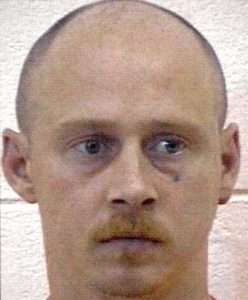Arthur Jenkins was executed by the State of Virginia for a double murder
According to court documents Arthur Jenkins and a teenage accomplice would go to the home of Jenkins Uncle Floyd Jenkins, 72. The pair would murder the Uncle and the uncle’s friend Lee Hopewell Brinklow, 69. The pair would rob the home before fleeing
Arthur Jenkins would be arrested, convicted and sentenced to death
Arthur Jenkins would be executed by lethal injection on April 20 1999
Arthur Jenkins Photos

Arthur Jenkins Case
Arthur Ray Jenkins III, who murdered his uncle and another man in Warren County, was executed by injection tonight after Gov. James S. Gilmore III (R) rejected his plea for clemency. The U.S. Supreme Court rejected his final appeal on Monday.
Jenkins, 29, whose attorneys argued in appeals that he was mentally ill from years of physical and sexual abuse, was pronounced dead at 9:05 p.m. at the Greensville Correctional Center in Jarratt.
“Forgive me for my sins,” Jenkins said when asked for a final statement. He cried out several times as prison officials inserted needles that would carry the lethal chemicals into his body.
Jenkins, who lived in Front Royal, was convicted of capital murder in the Oct. 12, 1990, slayings of his uncle, Floyd Jenkins, 72, and Lee H. Brinklow, 69.
According to a court summary of the case, Arthur Jenkins and a younger brother, Kevin Frame, had been drinking when they went to a house shared by Jenkins’s uncle and Brinklow
An argument ensued, and Arthur Jenkins took a .22-caliber rifle from a bedroom and shot his uncle and Brinklow, then repeatedly stabbed the uncle. Jenkins then broke into his aunt’s bedroom and stole money and other items.
His attorneys said Jenkins was neglected, beaten and sexually abused as a child. He then spent a decade in juvenile institutions. He was judged to be mentally ill and placed on antipsychotic medication when he was 13.
At 16, Jenkins was sentenced to seven years for burglary and grand larceny for breaking into a gas station and was sent to adult prison. He received antipsychotic medications while incarcerated.
In 1989, he was transferred to the Washington County jail for his own protection after he told authorities about a prison slaying. While there, he was cut off from his medication and, according to his appeal, suffered “outrageous physical and mental abuse” at the hands of the chief jailer
Jenkins was released from the jail Sept. 6, 1990, without supervision or medication, said his attorneys, Charles F. Witthoefft and Ian J. Wilson. He had been out of jail 36 days when he committed the two murders.
The jury never got to hear of the alleged abuse suffered by Jenkins in jail. A federal appeals court ruled that the evidence of the abuse could not be raised because it was not introduced earlier.
The Virginia attorney general’s office said Jenkins’s criminal record is unchanged by the new abuse claims.
Gilmore, in denying clemency, said that the slayings of the two elderly men were “excruciatingly brutal” and that Jenkins, while on death row, had assaulted guards and was found with a razor blade fashioned into a homemade knife.









